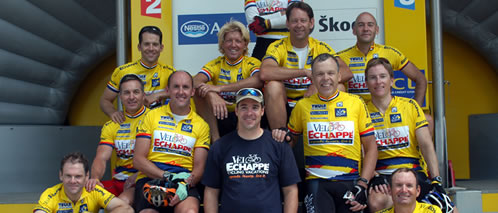What was supposed to be another blissful Sunday biking on the Longleaf Trace turned into an extended hospital stay for a local professor - and his wife said Monday the ordeal could have been easily avoided.
An avid cyclist who participated in the leg of the Tour de France that was open for the first time to amateurs last year, John Harsh mounted his bicycle Sunday and set off for a ride with more than a dozen fellow cyclists who ride the rails-to-trails route on a weekly basis, his wife Ann Harsh said.

John Harsh, 4th from the left in the middle row
Harsh was leading the group when he called out to another cyclist ahead of him, signaling the group's intention to pass on the left per the Trace's posted rules, she said. But he didn't notice the rider he was passing was wearing tiny headphones and had not heard the warning - and when he finally noticed Harsh, it was too late. The unidentified cyclist swerved into Harsh, 60, knocking him off his bicycle, cracking his helmet and puncturing one of his lungs, his wife said. Another member of Harsh's group was also injured, but the cyclist wearing the headphones emerged unscathed.
"It could have been much, much worse," Ann Harsh said. "This person really wasn't following the rules-of-the-road signs posted on the rails-to-trails that tell you to stay on the right. He was smack dab in the center."
Her husband, a University of Southern Mississippi psychology professor, is still in a lot of pain and is expected to remain in the hospital at least another couple of days, she said.
Cyclists should never wear headphones, said James Moore, owner of Moore's Bicycle Shop and president of Bike Walk Mississippi, a cycling and pedestrian advocacy group.
"You should never, never wear them under any circumstances unless you're sitting on an exercise bike at the gym," Moore said. "You've removed half of your ability to respond to the outside world when you shut off your hearing."
Etiquette rules on the Trace are simple, he said. Whether riding or walking, people should bear to the right except when passing, he said. Cyclists should yield to pedestrians and all should yield to riders on horseback.
When preparing to pass, travelers should alert those around them with a polite, audible verbal warning, Moore said; bicycle bells are particularly useful for this purpose.
Perhaps most important in preventing injury is wearing a helmet, Moore and Ann Harsh agreed.
"If (my husband) hadn't had a helmet on, I have no idea," she said. "I don't even want to go down that road."